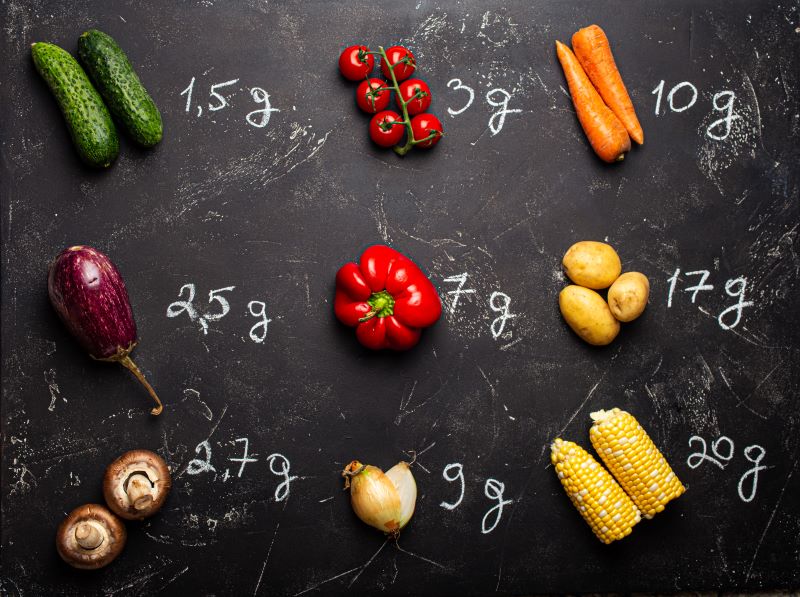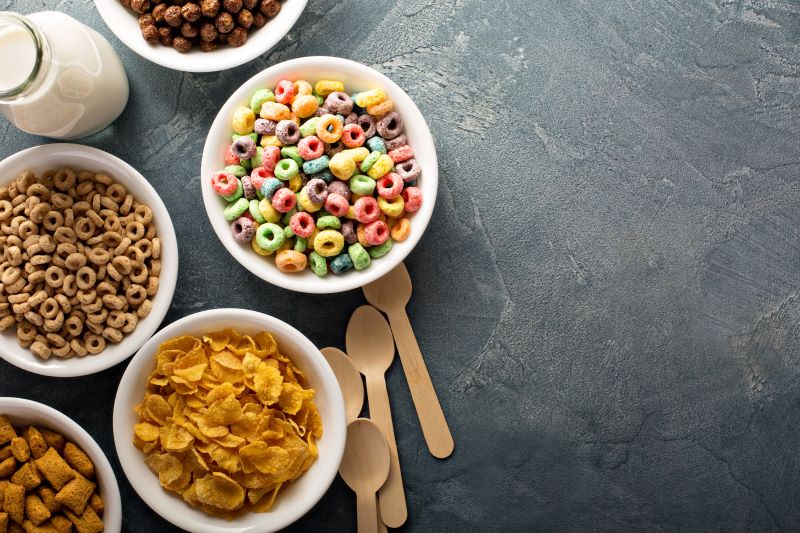43 Carbohydrate Rich Foods, Fruits & Vegetables to Include in Your Diet

Carbohydrates are the main source of energy for the body and are, therefore a crucial part of any well-balanced diet. Nevertheless, not all carbs are made equal. This complete guide will look at different carbohydrate rich foods, fruits and vegetables with various flavours and nutrients to choose from as you plan your meals. These carbohydrate sources contain proteins that provide energy to the body while having multiple health benefits.

Table of Contents

What are Carbohydrates?
Carbohydrates are the kind of substances that keep your body functioning properly. They can be found in a variety of foods and drinks that you consume daily, such as bread and pasta, fruits, and vegetables. In essence, they consist of carbon, hydrogen, and oxygen and are of various types, including sugars, starches, and dietary fibres.
Consider carbohydrates as your body's primary fuel. When you eat carb-rich foods like rice or potatoes, your body will convert them into sugars that act as fuel for all forms of activity, from walking to thinking. Some carbohydrates found in fruits and whole grains contain fibre, which also helps maintain healthy bowel movements and may aid in weight control.
What are the Sources of Carbohydrate?
Several food sources contain carbohydrates, making choosing from various options that meet your diet requirements easy.
Grains such as wheat, rice, oats, and corn are basic sources of carbohydrates commonly present in breads, pastas, and cereals, among other things. These grains may provide either quick or sustained energy, thus forming an important part of many people’s diets worldwide.
Top 43 Food Items High in Carbohydrates
To provide your system with essential energy, indulge in a wide range of carbohydrate-laden foods. These top 43 food items offer various options for your carbohydrate requirements, such as substantial grains and sweet fruits, satisfying dairy products, and crispy nuts. This comprehensive list contains a variety of selections, from quick energy boosters to healthy meal choices.
List of Carbohydrate Rich Vegetables

Vegetables aren’t just about vitamins and minerals—they are also rich in carbohydrates, an important source of energy. Below is a list of carbohydrate rich vegetables that can enhance the taste and nutrition of your meals.
| SNo | Vegetables | Description |
| 1 | Cooked Potatoes | 23 grams of carbohydrate in 100 grams |
| 2 | Cooked Sweet Potatoes | 20 grams of carbohydrate in 100 grams |
| 3 | Cooked Corn | 21 grams of carbohydrate in 100 grams |
| 4 | Cooked Carrots | 7.33 grams of carbohydrate in 100 grams |
| 5 | Cooked Plantains | 58 grams of carbohydrate in 100 grams |
| 6 | Cooked Beets | 10 grams of carbohydrate in 100 grams |
| 7 | Cooked Butternut Squash | 22 grams of carbohydrate in 100 grams |
| 8 | Cooked Peas | 46.5 grams of carbohydrate in 100 grams |
| 9 | Cooked Parsnips | 35 grams of carbohydrate in 100 grams |
List of Fruits Rich in Carbohydrate

Fruits are also sweet gifts from nature; they contain high levels of carbohydrates, thus providing a sugary and healthy energy boost. Here are different types of carbohydrate rich fruits for you to gratify your taste while feeding your body.
| SNo | Fruits | Description |
| 10 | Bananas | 23 grams of carbs in 100 grams |
| 11 | Grapes | 17 grams of carbs in 100 grams |
| 12 | Mangoes | 25 grams of carbs in one cup of chopped mango |
| 13 | Cherries | 12 grams of carbs in 100 grams |
| 14 | Figs | 19 grams of carbs in 100 grams |
| 15 | Pineapples | 13 grams of carbs in 100 grams |
| 16 | Apples | 14 grams of carbs in 100 grams |
| 17 | Dates | 75 grams of carbs in 100 grams |
List of Cereals and Dairy Products Containing Carbohydrates

Cereals and dairy products, like breakfast essentials or dairy delights, provide easy access to yummy carbohydrates. Choose something great from the list below for nourishing options that keep you energised throughout the day.
| SNo | Cereals and Dairy Products | Description |
| 18 | Oats | 56 grams of carbohydrates in one serving of 100 grams |
| 19 | Corn Flakes | 84 grams of carbohydrates in one serving of 100 grams |
| 20 | Rice Cereals | 82 grams of carbohydrates in one serving of 100 grams |
| 21 | Granola | 64 grams of carbohydrates in one serving of 100 grams |
| 22 | Muesli | 68 grams of carbohydrates in one serving of 100 grams |
| 23 | Milk | 5 grams of carbohydrates in one serving of 100 grams |
| 24 | Yoghurt | 4 grams of carbohydrates in one serving of 100 grams |
| 25 | Cottage Cheese | 3 grams of carbohydrates in one serving of 100 grams |
| 26 | Regular Cheese | 1.4 grams of carbohydrates in one serving of 100 grams |
| 27 | Ice Cream | 20 grams of carbohydrates in one serving of 100 grams |
List of Seeds and Nuts Rich in Carbohydrate

Seeds and nuts for snacking are not only carbohydrate-packed items that offer satisfaction when bitten down and are a good source of nutrition. To texture up your food while meeting your daily intake on a carbohydrate basis below is a selection to ponder upon.
| SNo | Seeds and Nuts | Description |
| 28 | Chia Seeds | 42 grams of carbohydrates in 100 grams |
| 29 | Flax Seeds | 29 grams of carbohydrates in 100 grams |
| 30 | Pumpkin Seeds | 10 grams of carbohydrates in 100 grams |
| 31 | Sunflower Seeds | 20 grams of carbohydrates in 100 grams |
| 32 | Sesame Seeds | 26 grams of carbohydrates in 100 grams |
| 33 | Almonds | 22 grams of carbohydrates in 100 grams |
| 34 | Pecans | 14 grams of carbohydrates in 100 grams |
| 35 | Walnuts | 14 grams of carbohydrates in 100 grams |
| 36 | Cashews | 30 grams of carbohydrates in 100 grams |
| 37 | Pistachios | 28 grams of carbohydrates in 100 grams |
List of Animal and Seafood High in Carbohydrates

While commonly related to protein, specific animal commodities, such as seafood, also contain some carbohydrates. Find the surprising carbohydrate sources below that give you different alternatives for adding high-energy foods to your menu.
| SNo | Animal and Seafood | Description |
| 38 | Clams | 5 grams of carbohydrates in 100 grams |
| 39 | Mussels | 7 grams of carbohydrates in 100 grams |
| 40 | Lobsters | 1.2 grams of carbohydrates in 100 grams |
| 41 | Oysters | 4.9 grams of carbohydrates in 100 grams |
| 43 | Shrimp | 0.2 grams of carbohydrates in 100 grams |
How Much Carbohydrate Should You Intake?
RDA (Recommended Daily Allowance), determining the appropriate daily intake of carbohydrates is essential for maintaining optimal health. The recommended amount varies depending on factors such as age, sex, and life stage.
The table given below outlines the recommended daily intake of Carbohydrate for different demographics:
Age Group |
Recommended Carbohydrate Intake (grams per day) |
| Infants 0-6 months | 60 grams of carbohydrates per day |
| Infants 7-12 months | 95 grams of carbohydrates per day |
| Children 1-3 years | 130 grams of carbohydrates per day |
| Children 4-8 years | 130 grams of carbohydrates per day |
| Children 9-13 years | 130 grams of carbohydrates per day |
| Teenagers 14-18 years | 130 grams of carbohydrates per day |
| Adults 19+ years | 130 grams of carbohydrates per day |
| Pregnant Teens/Adults | 175 grams of carbohydrates per day |
| Lactating Teens/Adults | 210 grams of carbohydrates per day |
Health Benefits of including Carbohydrate Rich Foods in your Diet
Carbohydrates provide the body with energy to perform different functions and activities. They serve as constant fuel for physical activities, manage blood sugar levels, and have other health benefits.
- Energy Source: Carbohydrates are the primary source of energy. It provides glucose, i.e. food, which can be converted into energy and used for physical activity, brain function and general well-being.
- Nutrient-Rich: Many carbohydrate-containing products supply nutrients that play irreplaceable functions in preserving good health, enabling digestion, and fighting chronic diseases.
- Heart Health: High soluble fibre derived from oats, beans, and certain fruits functioned as a preliminary defence against heart diseases in the form of reduced cholesterol levels.
- Weight Management: Complex carbohydrates with high fibre content are preferable to prevent overeating due to the reasons of satiety.
- Blood Sugar Control: A balanced intake of carbohydrates, combined with proteins and health-protecting fats, contributes to maintaining a stable sugar level and lowering the risk of insulin resistance and type 2 diabetes.
- Digestive Health: The natural fibres in carbohydrate rich foods further digestion and also help to prevent constipation.
- Athletic Performance: Carbohydrates are an integral fuel for athletes as they make quickly available energy for the workouts and recovery processes.
Different Ways to include Carbohydrate Rich Foods in your Diet
Ensuring an adequate intake of carbohydrate rich foods is essential for maintaining overall health and well-being. Here are some research-backed tips to help you incorporate more Carbohydrate into your diet:
- Whole Wheat Staples: For nutrient-rich food and digestive health, use quinoa, brown rice, or whole wheat pasta as the mainstay of your meals.
- Snacks with Fruits and Vegetables: Eat fresh fruits like apples or berries for snacks and vegetables, including carrots and bell peppers throughout the day.
- Add Legumes:Lentils, chickpeas, or black beans can be used to make salads, soups, and side dishes, adding flavour and texture.
- Enhance Your Smoothie: Combine bananas or berries with some yoghurt or milk for a healthy smoothie consisting mainly of carbohydrates.
- Healthy Grains Substitutes: Use whole grain alternatives instead of refined grains when preparing recipes such as sandwiches, wraps, baked goods, etc.
- Starchy Veggie Choices: Serve starchy vegetables such as peas, sweet potatoes, or corn on the side or as part of the meal.
- Morning Options: A filling, carbohydrate-rich breakfast can also be served as oatmeal garnished with fruits and nuts, which makes you feel full for a long time.
- Fueling Before Exercise: Consume foods rich in carbohydrates before exercise, such as banana or peanut butter sandwiches done on whole wheat bread, will help to fuel your exercises before exercising
- Recovery After Exercise: Muscles need refuelling carbohydrates and protein after exercise. This can be achieved by drinking a smoothie comprising protein powder and fruits.
What are the Symptoms of Carbohydrate Deficiency?
Carbohydrate deficiency is a condition that may also be referred to as undernourishment, carbohydrate malnutrition or glucopenia, and it could result in various symptoms, including:
What are the Health Risks of Not Getting Enough Carbohydrates?
Here are the health risks associated with insufficient carbohydrates:
- Low Power: Carbohydrates are the main source of energy for body activities. Lack of adequate carbohydrate intake can cause low power levels and reduced physical performance.
- Inadequate Muscles: There may be a reduction in muscle mass and subsequent muscle weakness if not enough carbs are present to help body tissues generate ATP.
- Malnutrition: Foods that are rich in carbohydrates such as vegetables, whole grains, and fruits provide essential vitamins, minerals and fibre and their absence leads to malnutrition.
- Mental Problems: Mental confusion and difficulties concentrating may also occur when there is an insufficient supply of glucose to the brain.
- Hypoglycemia: Low-carb diets can result in very low blood sugar levels (hypoglycemia) bringing about dizziness, feebleness, disorientation and sometimes blackouts or faintin
What are the Side Effects of Excessive Carbohydrate Intake?
Although carbohydrates are the energy sources the excessive content in your diet can lead to more harm than good. It makes your body react differently making it worse. Here are a few possible side effects:
- Excessive Weight: Weight gain can arise from too much carbohydrates through their influence on insulin levels and energy balance.
- Increased Blood Sugar Level: Eating a lot of carbohydrates can cause a peak in blood sugar level that triggers insulin resistance leading to type 2 diabetes.
- Metabolic Syndrome Risk: High carbohydrate diets worsen the development of metabolic syndrome, causing obesity, hypertension and hypercholesterolemia.
- Digestive Problems: Abundant consumption of refined carbohydrates may be accompanied by digestive problems like bloating, gas and discomfort.
- Energy Changes: Intake of large amounts of carbohydrate gives rise to energy swings causing fatigue and irritability.
- Dental Ailments: A high intake of processed carbohydrates and sugars may also contribute to dental problems such as cavities and tooth decay for example.
- Non-alcoholic Fatty Liver Disease Risks: Excessive intake of carbohydrates rich in added sugar particularly is associated with non-alcoholic fatty liver disease (NAFLD).
Should You Take a Carbohydrate Supplement?
Deciding when one should take a carbohydrate supplement should be based on an individual’s nutritional needs, health goals and way of life. However, it is generally better to get carbohydrates from whole food sources like whole grains, vegetables, fruits and legumes since they are highly nutritious.
However, there may be instances where the intake of carbohydrate supplements makes sense. Those athletes who engage in intense exercise over a period exceeding 90 minutes may require additional carbohydrates to maintain their energy levels and boost performance. Examples of such cases include energy gels; sports drinks or carbohydrate bars which can serve as a quick source of energy that is easy to ingest.
Carbohydrate supplementation should always be approached with caution and in consultation with healthcare providers including registered dieticians especially if you are considering incorporating them into your regime. They know your specific requirements taking into consideration your current health status and body fitness objectives among others.
Including various types of carbs in the form of food, fruits and veg can help provide your system with vital nutrients plus the power it requires to function properly. And so whether you like whole grains or eat colourful fruits or nutrient-rich veggies, numerous choices offer great taste as well as nutrition. Thus by accepting a range of carbohydrates, there is plenty of fuel for your body, better health and enjoyable diets too.













